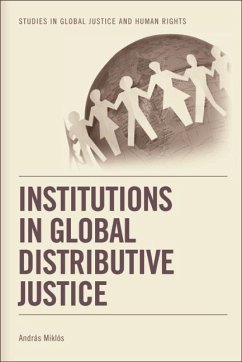Defining an institution as a public system of rules that sets out positions, rights and duties, this book uses a philosophical argument to analyse the roles that social, economic and political institutions play in conditioning the justification, scope and content of principles of justice. It critically evaluates a number of positions about the role of institutions in generating requirements of distributive justice and considers their implications for the scope - global or otherwise - of justice. It then develops a novel theory about the role political and economic institutions play in determining the content of requirements of distributive justice and, in a cosmopolitan argument against statist positions, shows how they can affect the scope of application of these requirements.
Dieser Download kann aus rechtlichen Gründen nur mit Rechnungsadresse in A, B, BG, CY, CZ, D, DK, EW, E, FIN, F, GR, HR, H, IRL, I, LT, L, LR, M, NL, PL, P, R, S, SLO, SK ausgeliefert werden.









